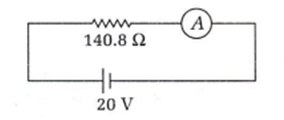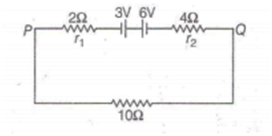 Multiple Choice Questions
Multiple Choice QuestionsA wire of resistance 10Ω is bent to form a complete circle. Find its resistance between two diametrically opposite point.

5 Ω
2.5 Ω
1.25 Ω
Ω
Find the resistance of a hollow cylindrical conductor of length 1.0 mm and 2.0 mm respectively. The resistivity of the material is 2.0 × 10-8 Ωm
2.1 × 10-3 Ω
1.3 × 10-4 Ω
3.2 × 10-4 Ω
4.6 × 10-2 Ω
A.
2.1 × 10-3 Ω
The area of cross-section of the conductor through which charges will be flow is
A =
A = 3
The resistance of the wire is therefore
R =
=
R = 2.1 × 10-3 Ω
The ammeter shown in figure consists of a 480 Ω coil connected in parallel to a 20 Ω shunt. The reading of ammeter is

0.125 A
1.67 A
0.13 A
0.67 A
A copper rod of length 20 cm and cross-sectional area 2 mm is joined with a similar aluminium rod as shown below

The resistance of pair of rods is (ρAl =2.6 x 10-8 Ω-m and ρCu =1.7 x 10-8 Ω-m)
1.0 mΩ
2.0 mΩ
3.0 mΩ
None of these
The electron of H - atom is revolving around the nucleus in circular orbit having radius with . The current produced due to the motion of electron is
zero
The galvanometer resistance is 30 Ω and it is connected to 2 V battery along with a resistance 2000 Ω in series. A full scale deflection of 25 divisions is obtained. In order to reduce this deflection to 20 divisions, the resistance in series should be
2470 Ω
2370 Ω
2180 Ω
2210 Ω
Two batteries of emf 3V and 6 V with internal resistances 2 Ω and 4 Ω are connected in a circuit with resistance of 10 Ω as shown in figure. The current and potential difference between the points P and Q are

A rod made up of metal is 1.2 m long and 0.8 cm in diameter. Its resistance is 3.5 x 10-3 Ω. Another disc made of the same metal is 2.0 cm in diameter and 1.25 mm thick. What is the resistance between the round faces of the disc?
1.35x 10-8 Ω
2.70 x 10-7 Ω
5.82 × 10-7 Ω
8.10 × 10-5 Ω
A body is moving along a rough horizontal surface with an initial velocity of 10 ms-1. If the body comes to rest after travelling a distance of 12m, then the coefficient of sliding friction will be
0.5
0.2
0.4
0.6
